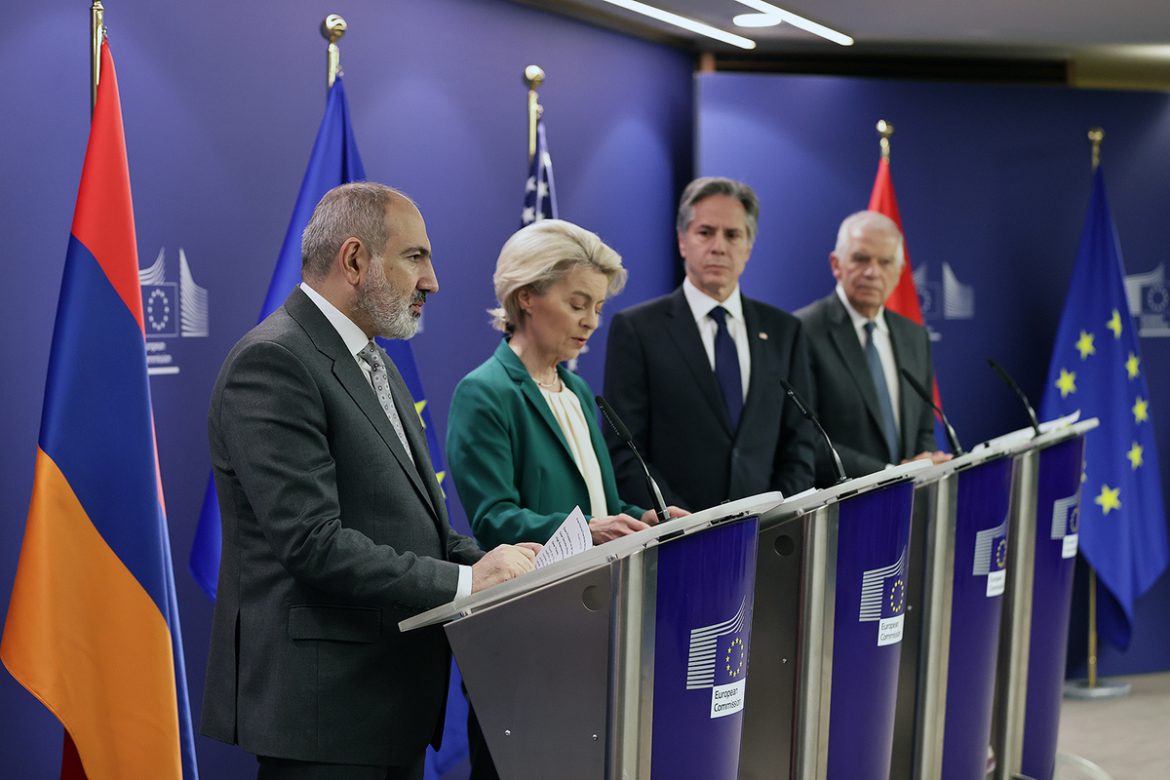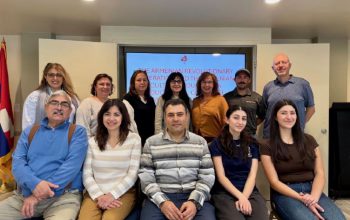By Ara Nazarian, PhD
The Armenian Weekly
The events in Artsakh (Nagorno-Karabakh) during the past four years have spotlighted the role of Armenian Prime Minister Nikol Pashinyan’s government in enabling the genocide of the Armenians of Artsakh. Pashinyan’s recognition of Artsakh as part of Azerbaijan, despite historical and cultural ties to Armenia, marked a significant policy shift that fundamentally disrupted Armenian life and presence in the region. Reports suggest that the U.S. State Department pressured Pashinyan to concede to Azerbaijani demands, urging peace talks and compromise to stabilize the South Caucasus.
Pashinyan came to power in 2018 with a wave of pseudo-democratic gestures and has since struggled to navigate geopolitical pressures from powerful actors such as Russia, Turkey and the United States. His decision to recognize Artsakh as Azerbaijani territory is seen by the majority of Armenians as a betrayal, a move that facilitated Azerbaijan’s aggressive campaign to displace Armenians from their ancestral homeland.
Under pressure from the U.S. and its Western allies, Pashinyan’s government began to distance itself from the long-held stance that Artsakh is an independent Armenian enclave. This shift came amid U.S.-brokered peace talks where Pashinyan, facing internal unrest and diplomatic isolation, was urged to prioritize broader peace and economic stability over territorial sovereignty. This decision emboldened Azerbaijan’s military efforts, culminating in the mass exodus of 120,000 Armenians from Artsakh, who faced annihilation after being subjected to a 10-month-long blockade, leaving the region entirely devoid of its indigenous Armenian population.
Pashinyan has dug his heels in on his stance, such as at the 2024 Global Armenian Summit, where he downplayed traditional Armenian patriotism and national identity. His statements, which were deemed apologetic to Armenia’s enemies (Azerbaijan and Turkey), further damaged his credibility, especially regarding Armenia’s security.
The U.S. State Department’s role in this process is contentious. Publicly, the U.S. has called for peace, stressing the importance of diplomatic solutions to regional conflicts. However, behind the scenes, there was growing pressure on Armenia to make concessions in exchange for yet-to-be-seen economic aid and political support. The United States did, however, as part of its “democracy building” efforts, train the Armenian police, who have used excessive force and violence to curb peaceful demonstrations by Armenian citizens. This harkens back to the days of the School for the Americas and its despicable legacy of suppressing protests in Latin America against incumbent puppet regimes.
Pashinyan argues that the Armenian government was coerced into a position that left Artsakh vulnerable to Azerbaijan’s military ambitions. His government downplayed Azerbaijan’s aggressive posturing and human rights violations, allowing Azerbaijan to secure international support for its actions in Artsakh. International observers, including human rights organizations, have documented widespread atrocities, including forced displacement, cultural erasure and violence against civilians. The mass evacuation of Armenians from Artsakh is a clear case of genocide, with Azerbaijani forces systematically dismantling the Armenian presence in the region. Despite these realities, Pashinyan’s government has maintained its stance, framing the issue as a necessary compromise for long-term peace.
The pressure from the U.S. to resolve the conflict through diplomacy may have been rooted in the desire to counterbalance Russian influence in the region and open up energy corridors. By securing Armenian concessions, the U.S. and its allies likely aimed to prevent further Russian intervention, even at the cost of Armenia’s historical claims to Artsakh. Pashinyan, caught between geopolitical interests, ultimately aligned with the West with little to show for it, leading to widespread criticism from Armenians at home and abroad.
Among a litany of missteps, Pashinyan’s leadership has been characterized by his inability to address Armenia’s growing security concerns. His efforts to align with the West did not yield tangible military or diplomatic backing, leaving Armenia exposed in its disputes with Azerbaijan. Furthermore, by distancing his government from long-standing allies such as Russia and Iran, Pashinyan deepened Armenia’s isolation, losing key security partnerships without securing solid support from the West, as the U.S. has made it clear that it will not offer military support against Azerbaijan and Turkey. This shift has worsened the country’s precarious geopolitical situation.
Realizing his isolation and having lost any leverage he may have had, Pashinyan made a trip to Moscow to meet with Putin this month. Putin brought up the increased trade volume with Armenia this year as yet another carrot that can be easily taken away. Notably, this trade volume increase is due to the import of items into Russia from elsewhere to avoid sanctions and not any increase in indigenous Armenian exports to Russia (which are down on all indices). Russia understands that Pashinyan is not a reliable partner and has no qualms about punishing him, and in turn the nation. For its short-term gains, Russia can easily work with Turkey and Azerbaijan to meet its needs at the expense of Armenia. Yet, due to its disastrous foreign policy engagement, Armenia has no place to turn to for support.
Pashinyan thinks he can go to Brussels or D.C. and sell one story, then go to Moscow and sell a different one, and these world players will buy his nonsense. Simply put, he is an opportunist, motivated by self-preservation to stay in power, who believes that he can introduce paradigm shifts in negotiations with world players whenever he does not like the hand on the table, highlighting his tenuous grasp on reality and detachment from true statecraft.
In a recent article, Dr. Jake Sotiriadis discusses how Western promises in the Caucasus region have not been matched by concrete actions (a prime example of over-promise and under-deliver). He argues that while the West pushed Armenia towards “democratization” and detachment from Russia, it failed to offer substantial security or economic support, leaving the country vulnerable and in a precarious geopolitical position with weakened defenses, strained international relations, and few if any, friends. Pashinyan callously dichotomized relations with Russia and the West, weakening Armenia’s geopolitical standing. A balanced foreign policy, rather than a zero-sum approach, is critical for future success, a process that the nakhkins understood and executed well despite their many shortcomings. Alienating one side for the other without any concrete support is diplomatic suicide, which is what Pashinyan and his administration have committed.
True to form, Armenia did not exercise its veto power against Azerbaijan hosting COP29, a mockery of “Western values” and environmental concerns. Pashinyan did so in return for the release of a few POWs, leaving the vast majority of the POWs, including Artsakh’s former leadership, subject to torture and isolation in Azeri gulags. Privately, the Armenian government has tried unsuccessfully to discourage U.S. lawmakers from attending COP29, and if attending, to not bring attention to Azerbaijan’s atrocious human rights and environmental record and the genocide of the Armenians of Artsakh. This defeated and collaborationist mentality has been the hallmark of this regime’s non-existent foreign policy to continuously acquiesce to the enemy’s wishes in return for peace, as elusive as the Loch Ness monster. Unfortunately, the majority of Armenia’s diplomatic corps is occupied by political appointees with little diplomatic experience, education or qualifications.
Pashinyan’s role in the genocide of Artsakh was heavily influenced by external pressures, particularly from the U.S. State Department, which pushed for diplomatic compromises that led to the Armenian population’s displacement. Deputy Assistant Secretary Yuri Kim publicly stated that the United States would not countenance the ethnic cleansing of the Armenians of Artsakh, just two days before the final Azeri military aggression to push Armenians out of their home, making a fool of herself and a mockery of U.S. diplomatic capacity. Similarly, during the 10-month blockade, Samantha Power and the USAID could not “ascertain” what was happening on the ground since “they did not have a presence in Artsakh.” However, once Armenians were driven out of Artsakh, she thought that a paltry $100 per displaced individual and a puff promo piece making jingalov hats ought to soothe the pain and loss. In the same vein, Russian President Vladimir Putin stated that the Russian peacekeepers’ hands were tied since Pashinyan had agreed that Artsakh was a part of Azerbaijan. So, everyone had a half-truth to present, while the truth of the matter was that Artsakh was betrayed from within while providing everyone with a cover — except the Armenians of Artsakh and the dignity of the Armenian nation.




